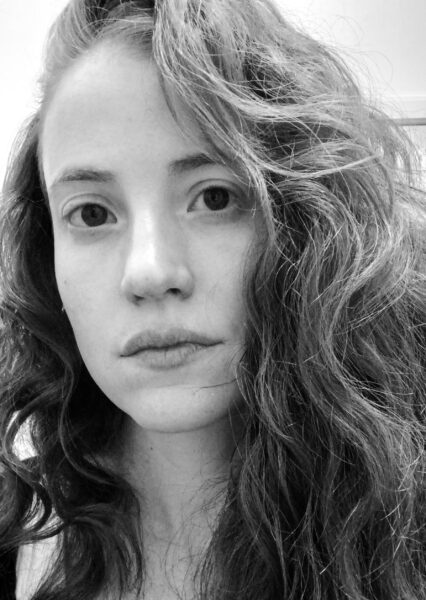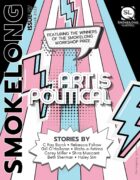Grief and loss seem to be themes that interest you. Is there something about the flash form that seems particularly able to get at those things?
Fiction in general lays the private self bare, makes it welcome and more palatable. Flash fiction, particularly, makes it palatable because we aren’t spending two hundred pages up close and personal with else’s sustained grief, which can be an uncomfortable and overwhelming place indeed. Somewhat paradoxically, however, because flash fiction by nature requires compression and rapid escalation (even if subtle), it can also provoke a reader to feel things very quickly and very deeply, like a song.
The opening images in this story—the idea of crawling in and occupying a lover’s body—are so vivid and creepy. It sets a tone immediately. The main character occupies her lover’s body, as the dead lover occupies the rooms in the house—so the question raised by that first section is who is doing the haunting. Can you talk a little about that?
I wanted to mimic that sort-of dissociated, untethered psychological state a person inhabits after great loss. While I hope there is at least a small sense of narrative shape—rising action and all that—it made sense for me to prioritize atmosphere over plot. In my vision of the story, the protagonist is being haunted by an expected child who she has very recently lost to a miscarriage or some other complication. A child is, in a sense, the ultimate form of lover, strictly on the level of how much love one feels. Just as she is being haunted by the presence of her unborn child, she is haunting the house. She makes things move, she acts, but those actions lack a comprehensible purpose or form. Just as a ghost seems to float through time and space in a nonlinear fashion, she does, too.
I was struck by the use of this word in the opening paragraph: “lanugo.” It’s an unusual choice because it is associated with the hair on fetuses. Between the opening image using this word in particular and the idea of occupying the lover’s body, I wondered if you meant for the reader to read the opening as something in vitro or embryonic, and if so, what?
Interesting question! I think that if read as the loss of a romantic partner, there may be something to that. Perhaps fetal imagery suggests the very beginning of a relationship, and the present baby crying at the end of the story the final, unhappy conclusion of one. Really, I was imagining the word “lanugo” as a first suggestion of the loss of the protagonist’s unborn child. I tried to keep it subtle but sprinkled pointed language here and there. Amniotic fluid. Sperm and egg. The final baby cry through a window. I suppose I could have woven in a few more suggestions of this but I also kind of love the possibility of other readings, like the loss of a romantic partner. That might not have been an option if I had gone heavier on the baby references.
I’m curious about the bathroom section. It’s completely told in negatives instead of positives. Can you talk a little about that choice and your positioning of it within the story and in this particular part of the house?
I like making linguistic shifts, first because it keeps me interested, engaged, and surprised as I’m writing. I hope, too, that it adds provocative texture for readers. With the negative construction in the bathroom, it made sense on the level of affect for the protagonist to reach a point where she can only address an absence in terms of what is not the missing person. Perhaps she wishes these things were him, but alas, everything in the very confined bathroom space—a space where objects are really up close and personal—points back to what can’t be present. It made instinctual sense to me to isolate this linguistic mode in the bathroom, where we are usually alone and where we get clean and feel refreshed. But nothing there can refresh her from her sustained emotional malaise.
Your story is called “Haunts.” Do you believe in ghosts? Have you ever been haunted?
I am going to be Debbie Downer and confess that I do not believe in ghosts, as such. I do, however, believe in the figurative significance of ghosts. I very much believe that we can be haunted by the people, objects, places, even smells or sounds that we associate with loss, regret, shame, trauma, etc. Can we be haunted by happier things? Maybe! In this conceptual sense, yes, I’ve been haunted.



 The core workshop of SmokeLong Fitness is all in writing, so you can take part from anywhere at anytime. We are excited about creating a supportive, consistent and structured environment for flash writers to work on their craft in a community. We are thrilled and proud to say that our workshop participants have won, placed, or been listed in every major flash competition. Community works.
The core workshop of SmokeLong Fitness is all in writing, so you can take part from anywhere at anytime. We are excited about creating a supportive, consistent and structured environment for flash writers to work on their craft in a community. We are thrilled and proud to say that our workshop participants have won, placed, or been listed in every major flash competition. Community works.